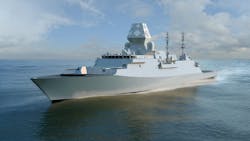Lockheed Martin continues with design of new command and control combat system for future Navy frigate
WASHINGTON – Shipboard electronics experts at Lockheed Martin Corp. will continue developing the combat management system for the U.S. Navy's future frigate surface warships under terms of a five-year $15.7 million order announced last week.
Officials of the Naval Sea Systems Command in Washington are asking the Lockheed Martin Rotary and Mission Systems segment in Moorestown, N.J., to continue developing Frigate Combat Management System (CMS) for the future FFG(X) guided missile frigate.
Frigates are relatively small, light, and fast surface warships that protect the powerful capital ships, and provide escort protection and help with command and control for lightly armed naval surface warships, as well as to commercial or military merchant ships.
FFG(X) describes a future class of multi-mission guided-missile frigates for the U.S. Navy, to be contracted from 2020 as a follow-on to the modular Littoral Combat Ship. The FFG(X) was announced two years ago. Navy experts have selected five shipbuilders to evolve their designs into a prospective design for the proposed 20 FFG(X) guided-missile frigates.
Related: The U.S. Navy's new frigate could pack a serious punch; think laser weapons and missiles
Frigates play a crucial role of keeping naval battle groups together, intact, and functioning in the face of the enemy. They screen ships from aircraft and submarine attack, and can act as advance scouts to determine what's beyond the battle group's horizon.
In addition to developing the combat management system for the Navy's FFG(X), Lockheed Martin also builds the Navy's Aegis combat system for Navy Arleigh Burke-class destroyers and Ticonderoga-class cruisers at its Moorestown, N.J. facility.
Lockheed Martin now builds the combat management system for the Navy's Freedom-class littoral combat ships. Independence-class littoral combat ships, meanwhile, use a combat system developed by Northrop Grumman Corp.
For the FFG(X), however, Lockheed Martin will base its Frigate Combat Management System (CMS) on the company's COMBATSS-21 ship combat management system, which is aboard the Freedom-class littoral combat ships.
Related: A once-proud class of U.S. Navy surface warships is quickly fading away
COMBATSS-21 is built on an open-architecture scalable framework using non-developmental software, Lockheed Martin officials say. Custom software adapters called boundary components support sensors, communications, and weapon interfaces, and are designed to accommodate future technology insertion and system upgrades with minimal effect on the system[s core software.
The COMBATSS-21 architecture isolates shipboard sensors, communications, and weapons from core components of the command and control system to avoid large system bugs and speed software certification.
COMBATSS-21 can run on computer configurations ranging from one commercial processor running a commercial operating system to more distributed configurations, to enable the COMBATSS-21 system adaptable to vessels ranging from patrol craft to large-deck ships, Lockheed Martin officials say.
The Lockheed Martin COMBATSS-21 combat management system borrows technology from Navy Aegis cruisers and destroyers, as well as the U.S. Coast Guard Deepwater program.
This contract calls for Lockheed Martin to modify CMS capabilities under development and integrate increased combat system element capability, resulting in an Aegis weapon system that aligns with FFG(X) class ships, Navy officials say.
Lockheed Martin will do the work in Moorestown, N.J., and should be finished by September 2021. For more information contact Lockheed Martin Rotary and Mission Systems online at www.lockheedmartin.com, or Naval Sea Systems Command at www.navsea.navy.mil.

John Keller | Editor-in-Chief
John Keller is the Editor-in-Chief, Military & Aerospace Electronics Magazine--provides extensive coverage and analysis of enabling electronics and optoelectronic technologies in military, space and commercial aviation applications. John has been a member of the Military & Aerospace Electronics staff since 1989 and chief editor since 1995.

